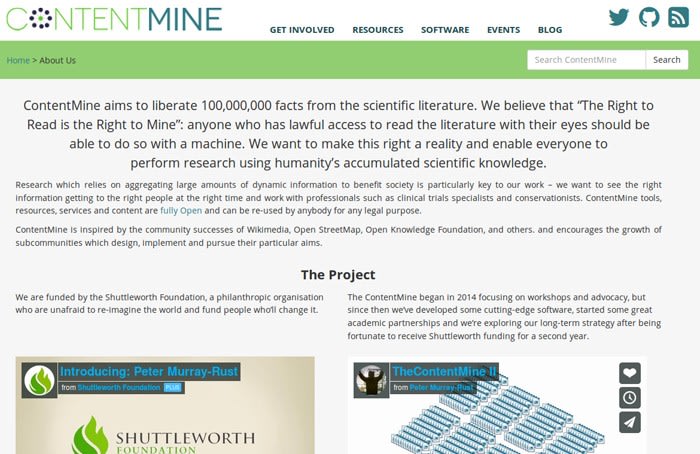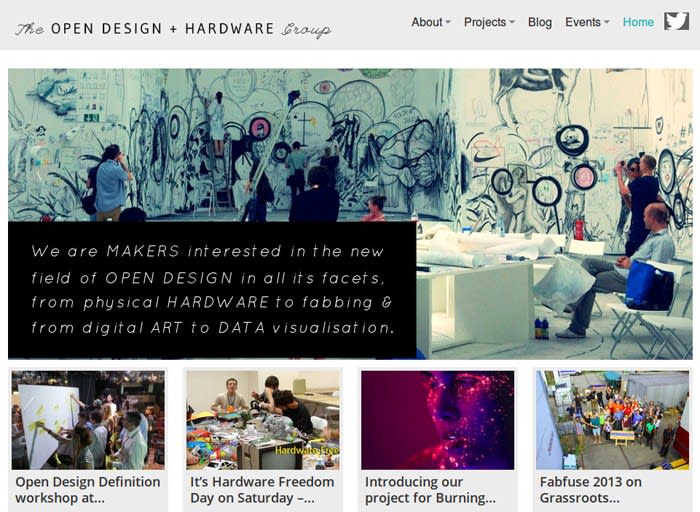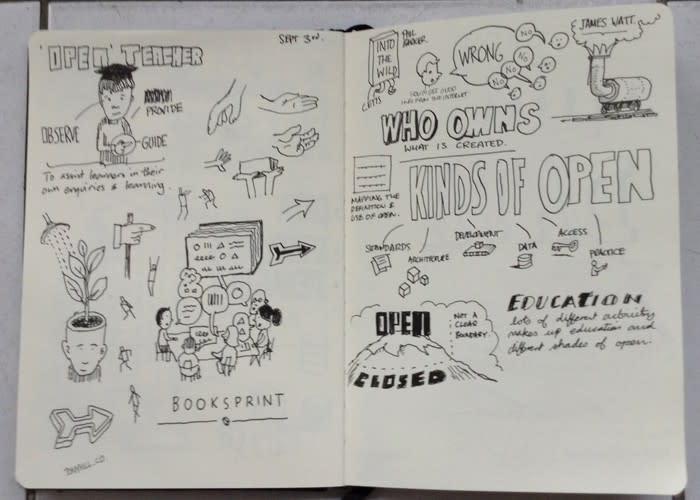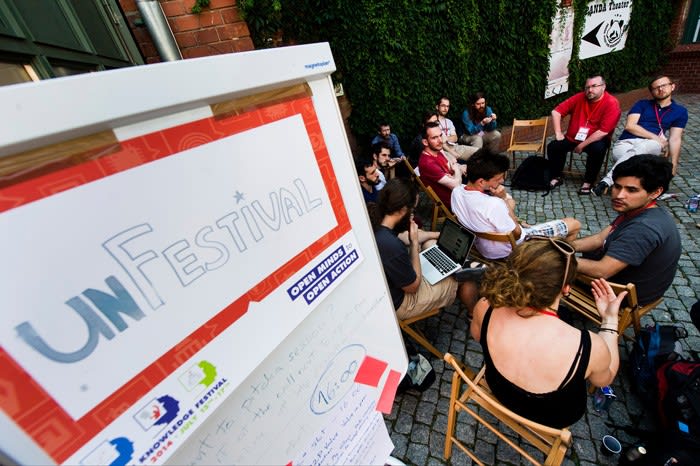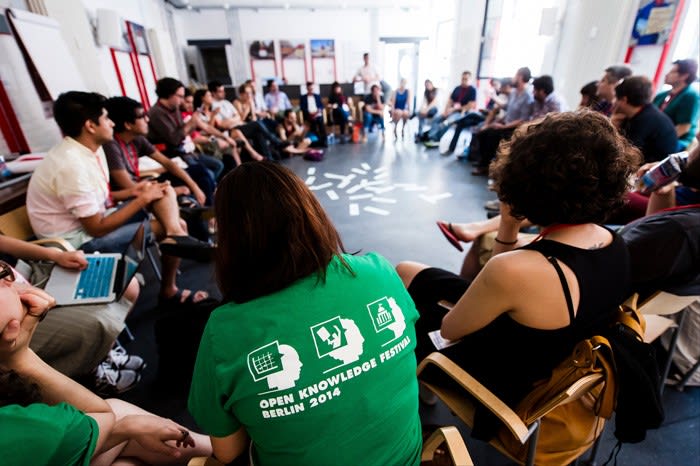Open Knowledge
Follow articleHow do you feel about this article? Help us to provide better content for you.
Thank you! Your feedback has been received.
There was a problem submitting your feedback, please try again later.
What do you think of this article?
Enabling access to information and tools for an enlightened society.
Many people will have heard of open source software and open source hardware, and open data is an increasingly hot topic. How else can open practices be useful and what are the benefits?
Open Knowledge (formerly the Open Knowledge Foundation) is an organisation founded upon open principles, with work including campaigning for the opening of data sets and building tools facilitating the use of such data. This post will take a brief look at examples of this work, as well as some of their recent events.
Creating and sharing knowledge
Founded in 2004, the Open Knowledge Foundation (hereafter referred to as OKFN) is “a worldwide non-profit network of people passionate about openness, using advocacy, technology and training to unlock information and enable people to work with it to create and share knowledge.”
Defining Open Knowledge as “what open data becomes when it's useful, usable and used”, their mission statement includes “We want to see enlightened societies around the world, where everyone has access to key information and the ability to use it to understand and shape their lives”.
To achieve this and more, OKFN has a growing international network, coordinates events, supports Working Groups and has released an Open Definition and Open Data Handbook.
Working Groups
There are many Open Knowledge Working Groups engaging in a multitude of activities, including lobbying for transparency, promoting open education and the opening of transport data.
Let's take a look at some example groups:
The OKF Open Science Working Group are “a global network of researchers, librarians, students, policy-makers, publishers, data-curators, entrepreneurs, activists and citizens who believe that open science is better science”.
According to Carl Boettiger, one member of the Open Science mailing list, “Greater openness makes science advance more quickly, more accurately, and with greater impact to the rest of the world.”
It is easy to appreciate how the sharing of scientific knowledge, procedures and results can foster innovation, with transparency and accountability reducing the prevalence of poor scientific practice. To facilitate this sharing, valuable resources provided include tools, guidance and a support network.
One project associated with the OKFN Open Science Working Group is ContentMine – aiming to “liberate 100,000,000 facts from the scientific literature” - making what can sometimes be oblique, hard-to-use data more convenient to access and use.
Open design includes the development of physical products, machines and systems through use of publicly-available design information. This may include software, hardware and resources or processes involved.
The Open Design and Hardware Working Group is “a global network of makers, academics, designers and openness advocates who are working to build a community of practice around open design and hardware across paradigms, from product design to architecture to digital design and physical art.”
Image by Flickr user autofunk78
Looking at both the theory and practice of open design, this group has worked on and released an Open Design Definition, as well as running workshops and discussions across Europe over the past few years.
Formalising the concept of open design and addressing the finer problems and points to consider are important benefits realised by this Open Design Definition.
The Open Education Working Group “Binds together people to promote open data, open educational resources (OER) and open educational practices”. There is a charter published with details about the group and how it is supported by the OKFN, and an active blog of recent projects, which include Open Education Licensing, and the promotion of OER in different countries.
One of the major projects of the Open Education Working Group is their Open Education Handbook, a collaboratively written guide targeted at educational institutions and teachers, providing guidance and understanding of how to use and contribute to open education resources.
To me, the value of having different working groups under the wider umbrella of the OKFN is clear: it allows for specialists to work together on the things they know best, whilst supporting, and being supported by, a larger body.
Open Knowledge in action
Alongside supporting Working Groups, OKFN has a number of active projects including the following:
CKAN is open source data portal software aimed at large bodies (such as governments and companies) wishing to make their data open and accessible. It is free to use, highly flexible and popular, implemented in projects across the world.
For example, it is used alongside Drupal to manage the data on data.gov.uk, with the UK Government now developing CKAN work in-house and contributing code back to the project, available on GitHub.
OpenSpending is the largest open database of public financial information in the world, with data sets from 75 countries. As well as providing useful data for journalists, activists and other users, the underlying code is open source and has been used by other groups to create their own, similar projects. Data from OpenSpending is also visualised in projects such as Where Does My Money Go, bringing transparency to UK public spending.
This work helped to secure the release of the 'COINS' database, the most detailed government spending data ever released, and is a strong example of how open data can increase government transparency.
Events
Bringing people together can help to build communities and kick-start new initiatives, and OKFN organises events that do just this:
OKFest and OKCon are large scale events run by the OKFN, involving the different Working Groups as well as experts, businesses and people from across the world keen to learn, network and contribute.
These multi-disciplinary events have an electric atmosphere, with plenty of opportunity for cross-collaboration between the different topic streams. Projects are launched and worked upon, ideas shared and more during the course of each.
Other smaller events are also held often by Local Groups – independent communities that form part of the Open Knowledge Global Network. These can be as informal as a few people meeting for a coffee, workshops, information exchanges or conferences. The OKFN has an online Events Handbook including guidelines and resources for running such events.
Summary
The OKFN does fantastic work in highlighting the value of open data and open knowledge, pushing the boundaries of what is possible whilst influencing governments and large companies to share more and more datasets. Who would have thought, 50 years ago, that government spending data would have been released to the public, for free?
By supporting the many different Working Groups, releasing open source tools and organising events, the OKFN is a world leader in the field of open knowledge, empowering people to do more with the resources available to them.
Interested in finding out more about open knowledge? Further reading is highly recommended, including the OKFN blog and wiki pages.
All photos, unless otherwise stated, taken from OKFN Flickr stream.





